In my column last month, we looked at the idea of challenging the narrative, and how this both supports and provokes community. Within this reflection, we were able to look at three different areas in which Pagans were challenging expectations within our own interconnected Pagan and Polytheistic communities. There are many ways that individuals, groups, and subsets are challenging what has become the operation of the over-culture within our community. The inevitable response to constructed boundaries within any segment of society becomes the pushing of barriers.
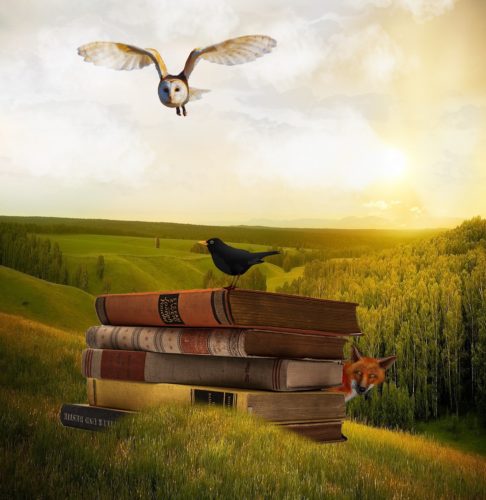 Marginalization and outsider politics happen within every community. Considering the impact of such dynamics can be difficult and are often based in perspective. Conversations will yield different responses from those who are connected more to a common narrative, than those who exist within the margins of the margin. As it is within most segments of society, acceptable narratives are more openly discussed and have a way of drowning out those that are not. Challenging the narrative often means identifying and amplifying the voices that are often underrepresented or too often lost in the repetitive nature of the over-culture.
Marginalization and outsider politics happen within every community. Considering the impact of such dynamics can be difficult and are often based in perspective. Conversations will yield different responses from those who are connected more to a common narrative, than those who exist within the margins of the margin. As it is within most segments of society, acceptable narratives are more openly discussed and have a way of drowning out those that are not. Challenging the narrative often means identifying and amplifying the voices that are often underrepresented or too often lost in the repetitive nature of the over-culture.
What happens when people actively push against the narrative of any community? Does the common story, language, history, symbolism, and practices of the mainstream serve as a means to marginalize those who do not fit within the prescribed narrative?
While subsets of our community continue to work to define modern Paganism or Polytheism, other subsets actively push against this notion. And some just do not fit within the sometimes narrow walls of any of the common narratives at the table.
In exploring the many different areas of these typical narratives, the over-culture, marginalization and the boundaries of conformity, I reached back into the pool of voices for four different perspectives. Coming from different places within the spectrum of our Pagan and Polytheistic community, I spoke with Tamilia Reed, Karina BlackHeart, Laura Tempest Zakroff, and Langston Kahn. People from different locations, spaces, paths, cultural histories, and trainings; all a part of our evolving communities’ narrative story.
* * *
Karina BlackHeart is a longtime teacher, mentor and practitioner. Her book, A Witch’s Book of Silence, was recently published in 2015 and focuses on many aspects of power, wisdom, love and self.
Crystal Blanton: How do you feel that writing about silence challenges the narrative of our current community?”
Karina BlackHeart: I hope it encourages people to stop and think before speaking. One of the downfalls of social media is that it engenders a kind of impulsive immediacy in response to information coming in. So, when we are challenged by opinions, practices, theologies or world views which differ from our own, the instinct is to respond defensively. And, because we are using platforms which effectively erase the words we read — losing them in a sea of other posts — that compulsion to react as soon as thought arises is a strong one!
Perhaps, a more mature or self-possessed response might be to sit with the “offending” information and engage is some self inquiry. As in, “Why is this making me so angry? Why do I feel defensive about this? Does this practice or theology invalidate my own? Why, exactly, do I feel the need to defend myself or blame and shame others?”
This line of questioning requires self-reflection. It takes time. It puts us face to face with our own stuff — insecurity, doubt, persecution complexes and ego attachments. It’s uncomfortable and, in the over-culture (of which we are a part, by the way) very unusual. Taking a step back, sitting with ourselves and entering silence allows us the opportunity to question ourselves rather than attack the Other. In doing so, we may find our beliefs are strengthened. Conversely, we might actually expand our world view.
I hope my work on silence helps explain why it’s so very important for magical people to engage with. But, I also hope it gives people permission to be still and silent when their impulse and the expectations of others demand the opposite.
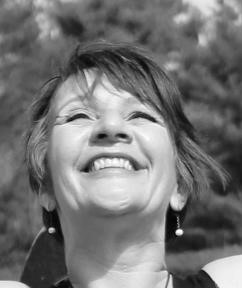
Karina BlackHeart [Courtesy Photo]
KBH: It’s an interesting question because when I wrote that piece about my lived experience as a white Mom parenting biracial, brown-skinned children, it had nothing to do with Paganism. I didn’t write it thinking, “I need to make a statement to Pagans about why black lives matter.” I wrote it because it felt important to me to respond in the way I could to the denial of racism in the over-culture. Again, we Pagans are a part of that and reflect many more of the values, beliefs and habits of the over-culture than we care to admit.
I needed to speak my Truth, my own lived experience in hopes that maybe even one of the “All Lives Matter” people or those holding on to the racially-biased perception that what POC report as lived experience is false, exaggerated, playing the victim etc.
As to the question of the Pagan culture impacting the way I navigate in those communities as the Mother of biracial kids, Yes. There certainly have been times when I’ve had to say to white Pagans speaking racist ideology, “Hey. My kids are black. You’re talking about my kids.” Most people respond by saying, “I’m not talking about *your* kids, I’m talking about *those* kids.” Then, I ask how they would tell my kids apart from those kids.
For the most part, though, I keep a pretty low profile with regards to my private life. My kids are my private life. Who I date is private. I was lucky, I think, to be trained in the Craft to question not only how the over-culture indoctrinates us into perpetuating systems of oppression and power-over, but to also question the ways and means Pagan subculture does the same. As a result, the way I navigate Pagan culture is to continually and purposefully keep a low profile.
* * *
Langston Kahn embodies a myriad of experiences, identities, and training that all push against the boundaries of any standard over-culture. He is a Shamanic practitioner initiated into traditions of the African Diaspora and a Black/Bi-racial man in New York City.
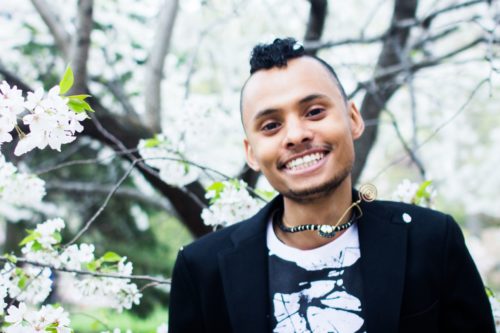
Langston Kahn [Courtesy Photo]
Langston Kahn: It’s so hard to answer this question because of the multiple Paganisms and polytheisms I’ve been a part of over the years along with the multiple marginalized identities I embody– black, biracial, queer. I first came up in neo-Paganism, specifically neo-Wicca. I didn’t find any real mirrors for my blackness there, the cultural influences and depictions of divinities were all overwhelmingly European. At the time however, it didn’t consciously bother me because I was struggling with my own identity issues as someone who was raised in a predominately white community. At that time in my life, Paganism provided a basic framework for engaging with the sacred that was extremely valuable for me, but it also always felt like something was missing.
Eventually I found my way to a traditional Gardnerian coven where I stayed for four years. All my coven mates were white, but my high priest was gay so that part of my identity felt fairly seen and included. It was interesting to talk with my High Priest about how he saw his sexuality at play in the tradition.
During this time I also found my way to MAGPAGAN, a gay men’s Pagan circle in NYC. Again, this space was predominately white but it was an extremely valuable space for learning to begin to lead ritual as anyone could volunteer each month to engage the other members in whatever ritual practice they were interested in. It also lead me to Between the Worlds, a Pagan gathering for those who identify as men who love men in Ohio.
Say it with me now– predominately white (I think there was one other person of color there when I went) but it opened me up to many facets of Paganism I had not yet experienced. Expert ritualists, Druids, extremely skilled Witches, shamanic practitioners, devotional polytheists, etc. I experienced some extremely catalyzing rituals there and I realized there was a way in which queer people / men who loved men connected traditions across the usual boundaries in a really beautiful and important way. For me this felt like seeing the dream of Paganism actualized. A big umbrella where people with many different traditions and perspectives could gather in a way that was respectful of their differences and created something larger than the sum of their parts.
I began to have a series of initiatory experiences with spirits that lead me away from my coven and to begin to study (and join)some indigenous traditions and begin a four year training program in a contemporary shamanic tradition. During this time I also joined a house of devotional polytheists. While this house was also largely white– many people in the house were also intimately involved in African Tradition Religions as well as contemporary shamanisms so they were able to provide much better support for both the identity work I was doing as well as the spiritual experiences I was having.
I found that polytheists emphasized the importance of decolonization as central to the practice far more than the Pagan communities I was a part of. They gave me insight into the type of ancestor work that demanded you do the hard work of bringing all of your many identities to the table and exploring and processing the pain those identities carry with them in our contemporary western culture which was invaluable to me. Suddenly I had frameworks for engaging all of my identities intimately in my spiritual process.
My shamanic tradition was where I finally found the tools I had been looking for to truly work with life as a teacher and begin to understand some of the unique challenges of our time and gain tools to address them. The work was centered around aligning more and more with the helping spirits that walk with us and our authenticity and so the teachings brought me to engage deeper with all of my identities.
CB: How do you feel that your spiritual work pushes the boundaries of the common community narrative?
LK: This question is hard for me as I’m not sure what the boundaries of the common community narrative are. In fact– that might actually be how my work challenges the common community narrative. I am part of a shamanic community that defines community as people coming together with shared skill sets and shared beliefs and principles. We strive to be contemporary people working together in a way that mirrors indigenous community structures. We strive not just to use indigenous technologies, but do the work necessary to transform the contemporary distortions from our culture within ourselves so we can approach the technologies closer to how indigenous / pre-contact peoples do.
So I think what challenges the common community narrative about my work is that I am deeply invested in communities that mirror indigenous communities where the bar is very high. People are expected to do their work or if they aren’t willing to, to leave the community. Additionally, there is an understanding that if someone is manifesting a problem, such as mental illness or physical illness– it is often something that the entire community needs to look at within themselves and how the individuals dynamics mirror the community dynamics.
The more I have experienced the treasure of having this type of community over the last five years, the less I am invested in using the word community to define groups of people that are not willing to cultivate the skills necessary to be in true community together. This might sound a little grouchy, and that’s not how I intend it, but the more I have experienced the gift of actual community (along with all of the headaches and challenges that it brings), the less I want to use the word describe anything less. I think we need to think carefully if we really do want to come together as a community and if so, we might need to acknowledge that collectively we need to learn new skills (for personal emotional work, non violent communication, mediation, leadership by council, etc) to be able to do so effectively rather than projecting the drama that arises or the failures to come together on “a few bad apples” that happen to be in focus because they have risked stepping into leadership.
* * *
Laura Tempest Zakroff is not just a great person, but is also a someone whose work is very inspiring in showing a balance between many different pieces that come together in unique ways. Her bio says that she “can be described by many different labels: artist, author, blogger, dancer, designer, event producer, teacher, witch – to name a few. Coming from a long line of diverging cultures, she is most at ease in blending her skills and inspirations throughout all of her work.”
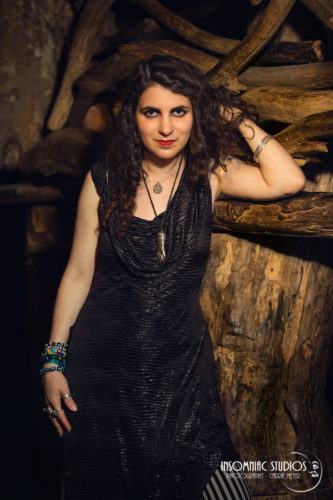
Laura Tempest Zakroff [Courtesy Photo]
Laura Tempest Zakroff: My first response to the question started with “it does?!” Then the list of things started building up quickly, providing the clear evidence on so many levels, so I suppose that really is true! I suppose that speaks to the fact that I’m often not found comparing my path as a Witch to others, which is extremely empowering in itself. I think that’s one of the most valuable lessons I’ve learned in the last 20 years – that when you trust your gut, ask questions and seek to find your own answers, you can see your own path so much more clearly. I know what works for me because I have done the experimenting, I have seen the results, and adjusted accordingly. There is a huge amount of freedom that comes with defining your own path through balancing instinct and intuition, research and revelation – as well as responsibility to yourself and the Divine.
CB: Have you felt restricted by the over-culture of common Pagan narrative and how do you navigate those boundaries within larger community?
LTZ: I can’t say that I’ve felt specifically restricted, but rather have used it as a guide to affirm what I do and don’t want in my practice. As a designer and artist by trade, I’m excited by problem-solving – I’d rather find a solution then get bogged down in the frustration and angst of the problem or specific experience. For example, many years ago, I attended a ritual at a Pagan Pride event that was a huge circle, with only a handful of certain people having any sort of active role in the center, while everyone else had to stand and watch for an hour what they did. It was static, long, and felt disrespectful to everyone else there. If I wanted that kind of ritual, I would have stayed in the Catholic Church! So instead, I focused on making sure that when I held a group ritual, it was a dynamic experience for everyone, that made them feel truly included as active participants to their level of comfort. I am huge supporter of integrating movement into ritual – connecting mind, body, and spirit.
I’m not about to tell anyone that the way they are approaching or doing something is “doing it wrong”, especially if it works for them. Instead, I can ask them about the how and why they do a thing for my own education and understanding. Also, I can talk about what works for me and why – and mutual respect if that works or doesn’t work for you. Nobody can tell you that your experience is wrong, especially when it involves the Gods. If anyone has a place to tell you you’re “doing it wrong”, the Gods do, and they tend to also show you how to do it right.
I will admit to having been nervous in a few situations where I’ve presented material at conventions/festivals that could be considered “out of the box” to the general P-word world. But whether that’s been regarding my take on Sigil Magick, Visual Alchemy, integrating dance and ritual, eclectic workings, the Self Divine, etc – the response has been incredibly positive, well-received, and exceptionally enthusiastic. Which means that it is striking a chord with many people who feel the same way, but maybe didn’t feel comfortable yet in expressing or exploring those concepts. I often tend to mix in humor with what I do, which always makes it easier for folks to grasp!
Next May, my first book The Witch’s Cauldron will be coming out from Llewellyn as part of their Witch’s Tools series. I’m very excited as well to see how it will be received, as I dig deep into some of the popular cauldron myths and uproot them, as well as I propose some new and unconventional ways to look at and use the cauldron in your personal practice. It follows my personal guidelines of: critical thinking, creative freedom, and personal responsibility.

Laura Tempest Zakroff [Courtesy Photo]
LTZ: I think there’s a fair amount of Judeo-Christian residue that we’re still running into in terms of organization/structure, doctrine, and practice that trickles down. Which is fair – as Paganism (or your favorite P-wordism) is still fairly young in modern culture, and it’s common to look to models that are around you. But we HAVE accomplished a LOT in a short amount of time.
I remember at the Pagan Leaders Summit in 2001 where we discussed issues about establishing temples and churches, helping inmates, getting Pagan symbols on soldiers’ tombstones, etc – and it’s astounding to see what’s happened along those agendas since then, and so much more! Or look to the social awareness and justice issues that are hot and important topics right now – the changes I’ve seen in just the last couple of years has been inspiring – and there’s still more to come! Whether this is a movement from the overall narrative downward, or from the subcultures upward, it’s working.
In the end, no one wants to be told they’re wrong, but everyone wants to be respected – and most people do want to make sure they’re being respectful to others. It’s a matter of spreading and sharing awareness in a way that educates and inspires, instead of excludes or alienates. That mode of thinking has been a very positive and invigorating influence on my work. I appreciate ideas and patterns that challenge me, that make me think and reconsider my own beliefs and actions, adjusting accordingly to make sure I’m being respectful and inclusive. I believe that being flexible, considerate, and fluid are integral to being a Witch.
* * *
Tamilia Reed is an author that brings much more than written word to the community. She currently writes for Patheos Pagan on several different blogs and draws on reconstructed Heathen, Hellenic, and Roman practices.
Crystal Blanton: Common narrative within community often reinforces the boundaries of inclusion or what inevitably becomes excluded. Do you feel that your experience within the larger Pagan and Polytheistic community has been inclusive of your various, intersecting, marginalized identities?
Tamilia Reed: I identify as a Black bisexual woman. In my experience, those identities intersect to form a unique experience that is not well captured by any subset of the three. Within the Pagan community, I believe that there is ample room for any number of identities. Whether or not those identities will be seen, recognized, and understood is a different issue entirely. I find that my identities as a bisexual and a woman have been more readily seen, recognized, and understood by others than my identity as a Black person.
This is not surprising given that race has a long, complicated, bloody, and uncomfortable history that violates many of the love and light principles that glue many brands of Paganism together. Consequently, my blackness is more often addressed as a physical characteristic than a socio-political identity complete with unique lived experiences. Only in the wake of police brutality in the media have more Pagans come forward and expressed their desire to learn more about my lived experiences as a Black person. Even then, the reality of what it means to be Black and a woman and bisexual is grist for the mill of another day.
Within polytheistic and reconstructionist communities, there is greater awareness of concepts like cultural appropriation and depending on the degree to which my Blackness is understood as cultural I am sometimes invited to those conversations but rarely does anyone start a conversation about race in America with me, and definitely not a conversation that engages contemporary expressions of Paganism and its underlying philosophies in connection with US race politics.
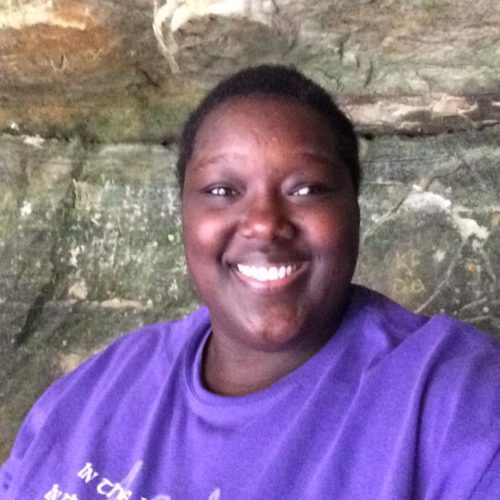
Tamilia Reed [Courtesy Photo]
TR: In a way, I feel that doing anything while being Black, woman, and bisexual pushes the boundaries of the common community narrative. The common community narrative says that my Black woman bisexual identity is welcome and beautiful, but not necessarily spiritually significant beyond what can be appropriated from the cultures that I am assumed to align with. My spiritual path pushes the boundaries by acknowledging my ancestors of blood and of spirit, by honoring gods at the intersections of my identities, and by pursuing social justice inside and outside of Pagan sacred spaces.
CB: Have you felt restricted by the over-culture of common Pagan narrative and how do you navigate those boundaries within larger community?
TR: Just as I have felt restricted outside of the Pagan community due to my Black bisexual woman identity, I have felt restricted within it. Since coming to Paganism I have noticed that my Blackness, when seen at all, is treated as a credit to the diversity of the community rather than a set of lived experiences worthy of communal and spiritual attention. In my attempt to navigate those boundaries, I work diligently to share my experiences as a Black bisexual woman with my Pagan friends and acquaintances. I am committed to giving voice to my experiences – the good and the bad – as a person with intersecting marginalized identities within the Pagan community. For me, overcoming the over-culture has meant recognizing it and daring to defy it in every circle I cast and in every relationship I cultivated across those problematic boundaries.
* * *
It is important to consider the effects of a culture that becomes too rigid and unable to be flexible with the ebb and flow of community. Whether or not modern Paganism or Polytheism has grown in that direction is not mine to decide. It is an evolving paradigm that each of us need to pick apart for ourselves in order to decipher what kind of community we are creating, and what kind of community we want. Any facet of society that does not acknowledge the grey areas, the role of the challenger, the beauty of difference, or the need to acknowledge the diversity of humanity leaves little room for the creativity that comes from the fringes. There are so many people operating within the margins of any given society, creating a narrative that will inevitably push against the status quo in ways that are culturally relevant, fresh and new, or can support a new way of embracing the art of engagement.
Some of the many gifts we have to share, or learn, come from perspectives, experiences, and variations that stretch us mentally and spiritually. Challenging the narrative pushes against an over-culture that often become monotonous. Once again, a reflection on the myriad of differences within our community opens door to discussions, insights, curiosity, and magic.
* * *
This column was made possible by the generous support of the members of Come As You Are (CAYA) Coven, an eclectic, open, drop-in Pagan community in the San Francisco Bay Area.
The views and opinions expressed by our diverse panel of columnists and guest writers represent the many diverging perspectives held within the global Pagan, Heathen and polytheist communities, but do not necessarily reflect the views of The Wild Hunt Inc. or its management.
The Wild Hunt is not responsible for links to external content.
To join a conversation on this post:
Visit our The Wild Hunt subreddit! Point your favorite browser to https://www.reddit.com/r/The_Wild_Hunt_News/, then click “JOIN”. Make sure to click the bell, too, to be notified of new articles posted to our subreddit.